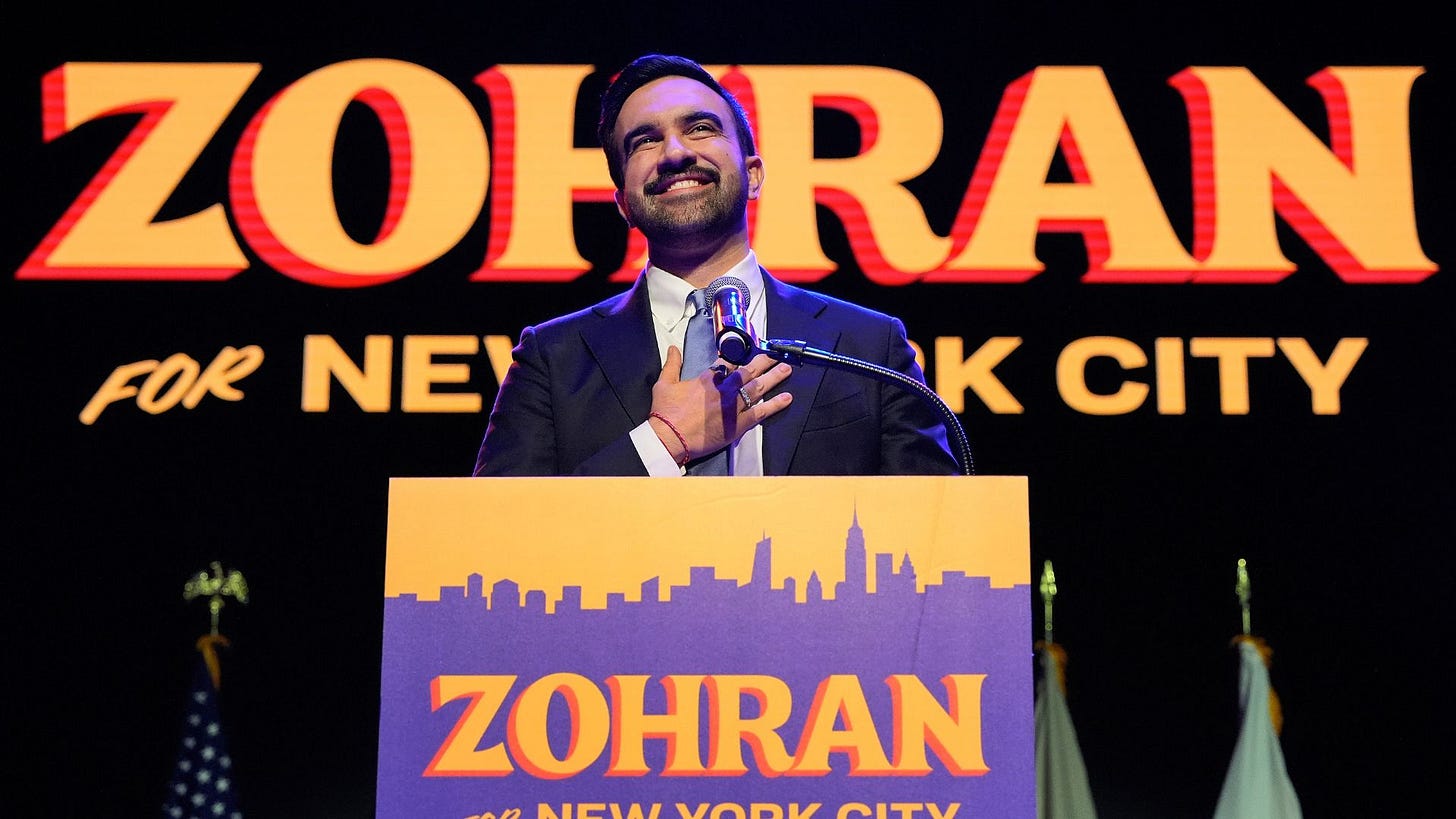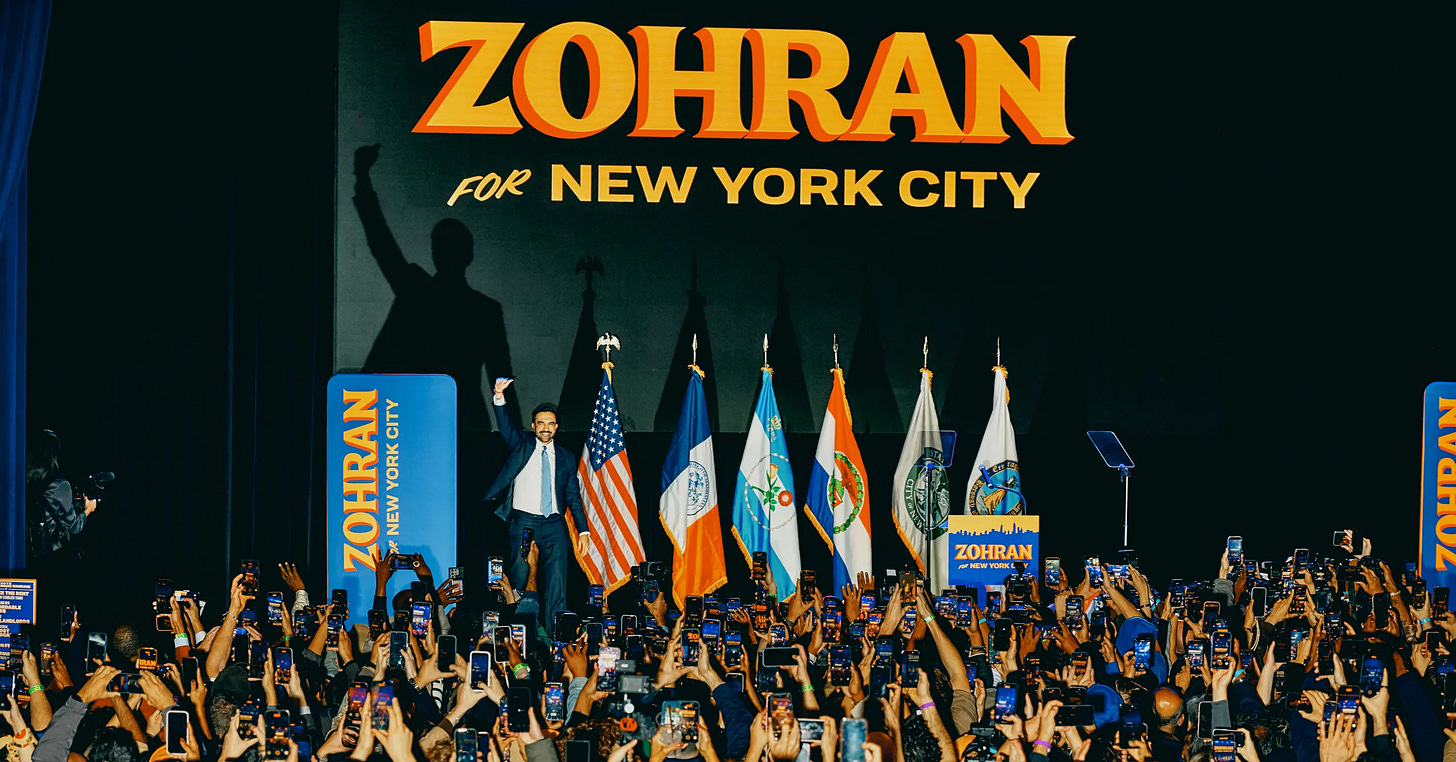Mamdani's Movement
What does victory look like?
Social media is terrific in its ability to shrink the world. Social media is terrible in its ability to shrink the world. Not once have I cared deeply about New York City’s mayoral race before 2025.
While the largest metropolis in the United States holds political relevance beyond its bounds, New York City’s leaders are usually introduced to me after they’ve assumed power. Surnames like Dinkins, Giuliani, Bloomberg, De Blasio, and Adams are unavoidable when consuming news and art, but I am largely ignorant of who they ran against to receive the mayorship, what their platforms were, and the extent to which their campaigns were viewed by those outside the five boroughs.
That wasn’t the case this time.
Zohran Mamdani’s Ugandan roots and leftist positions played perfectly into my algorithm. The “for you” tab on X looks like I live in Brooklyn. I was interested in whether a 34-year-old, Kampala-born, democratic socialist could win an election while being castigated by the ruling class. His campaign focused on affordability: rent, public transportation, and childcare. The message resonated with the working class in a city of eight million known for an exorbitant cost of living.
Tuesday evening, Mamdani handily defeated Andrew Cuomo and Curtis Silwa, earning more than half the two million votes cast. Watching his victory speech made me smile, but my happiness briefly transported me to an earlier moment.
I remembered seeing a picture of teenage Barack Obama with his father when he emerged as a viable presidential candidate in 2007. I saw myself in the photograph. Perhaps there are only so many facial options for children with east African fathers and white European mothers. It bonded me to his campaign of hope and change—despite my Canadian passport meaning I was ineligible to vote in 2008’s election.
When Obama won, I felt happy, but I know that feeling now as naïvety. I put no thought toward the kind of person who wants such power. Little thought to the global behemoth he asked to steward. Seeing myself in someone was enough and ultimately blinding.
My passport changed by 2012. I was able to vote, but my educational development and political consciousness had risen into seeing the American presidency for what it is: the throne of Western imperialism. An African President of the United States commissioning the elimination of African leaders and bombing the continent of his forebears had that outcome. I sat at home while Americans chose between Obama and Mitt Romney.
As a 35-year-old member of the Ugandan diaspora with leftist politics, Mamdani’s background (his Arsenal FC loyalties aside) strikes a similar chord of connection in me, but I wish to be wiser. The Mayor of New York City has far less capacity to destroy humanity than the President of the United States. Mamdani cannot enact regime change in foreign territories; his power is limited to Gracie Mansion. One is safe in that regard, but the ramifications of his victory will ripple beyond New York City’s five boroughs.
Effective political campaigns within democratic frameworks choose between two distinctive paths. The first is fear. Fear is corrosive. Fear of the other, of the future, of change, of loss. Fear of fear. It fractures an electorate into shards of glass. The second is hope. Hope is emulsive. Hope in each other, in the future, in the aspirational, in what can be. Hope in hope. It bonds an electorate into mutual partners.
Fear is easier to maintain than hope. The former is a primal emotion. Fear is so ingrained in the human psyche it is largely indistinguishable from thought itself. An argument can be made all thought, thus all action and inaction, is a consequence of fear or fears. Hope is a potential response to fear. It can be accepted, rejected, or never presented as an option.
Hope forms because the alternative is despair and nihilism, but once existent it need not persist. Hope can waver, falter, and brake, so it must be nurtured. Fostering hope politically looks like accountability. Winning an election isn’t winning. Winning is improving the lives of people at the bottom of the class pyramid. That doesn’t happen with votes. It happens before and after votes are collected with sustained efforts to target conditions that create inequality. Effort requires time, and to control how time is used, one must equally control hope. They work in tandem, lest the forces of fear—which have an easier time coalescing and finding funding—rally.
For Mamdani’s movement, accountability means persistent pulling by those on his left further leftward, fighting the rightward push from reactionary forces of fear and division—many existing within the Democratic Party.
I have no hope in the Democratic establishment assisting the platform Mamdani set forth. The party exists largely as a guardrail to stop any collective, organised, mass movement generating genuine leftward direction. Its role is bottling the frustrations of people disaffected by capitalism (and his brother fascism), and funneling their fury into a well-regulated political container. Mamdani usurped the party’s function with an impeccable campaign focused on the working class, but now elected, the systems which have crushed working people will work to drag him centrally.
I have hope in three things. Mahmood Mamdani and Mira Nair were known to me before their son. The former is a leftist political scientist with deep roots in Uganda. The latter is a filmmaker and director of Mississippi Masala and Queen of Katwe. I expect those rooted in rich historical and political traditions to maintain their political line. Second, the viral nature of Zohran’s campaign has drawn enough national and global attention that abandoning its three central tenets would make him an international laughing stock. Last, and most importantly, New Yorkers have placed genuine faith in Mamdani’s ideas. I don’t imagine the city’s residents being merciful if his administration betrays their trust.
Those hopes are tempered with sober realities. Mamdani is not revolutionary. He is a social democrat, but his New York City will unfortunately represent to most Americans what nominally leftist ideology is capable of achieving over the next four years. If he finds difficulty manipulating conditions in his favour—and the hope his campaign generated dissipates—the hill to climb for those further to his left becomes steeper. That said, I’m allowing what little happiness I have to blossom within limits. Losing optimism breeds cynicism.▪️




Good piece Daniel. Accountability is important. People are allowed to feel happy and hopeful but can't become complacent. 🙏🏼